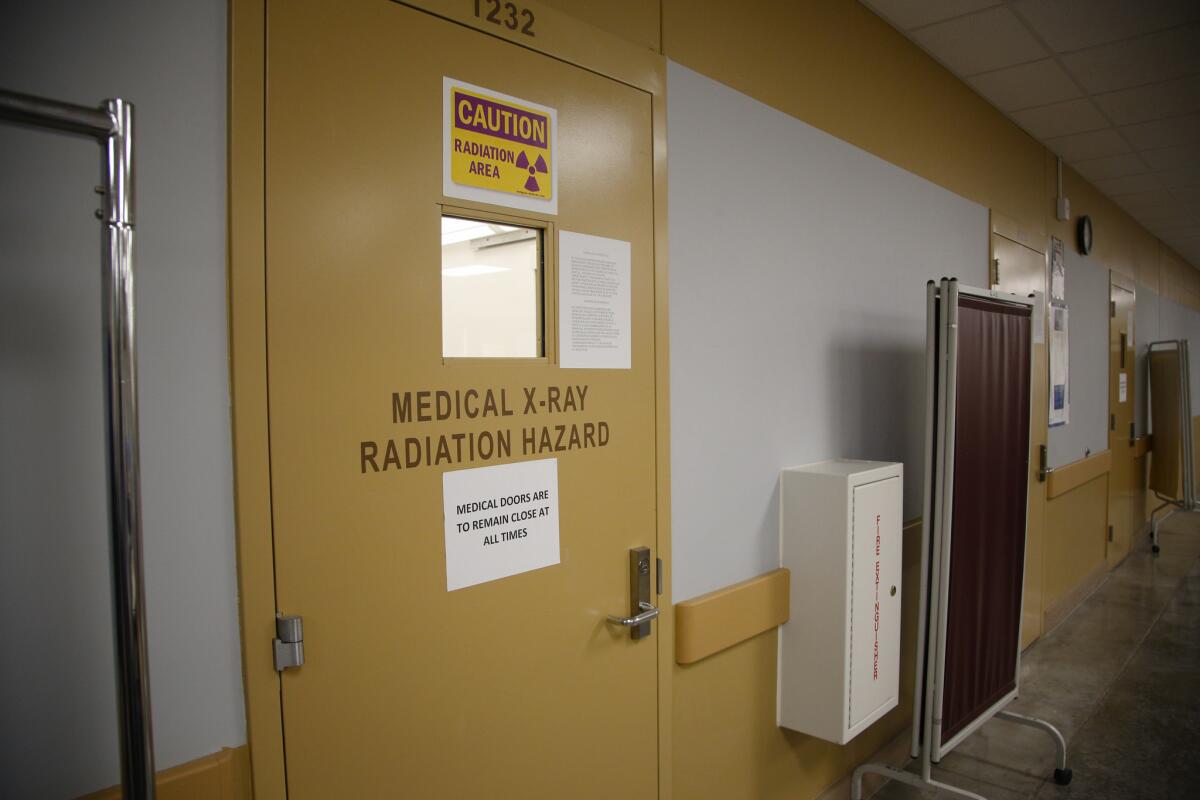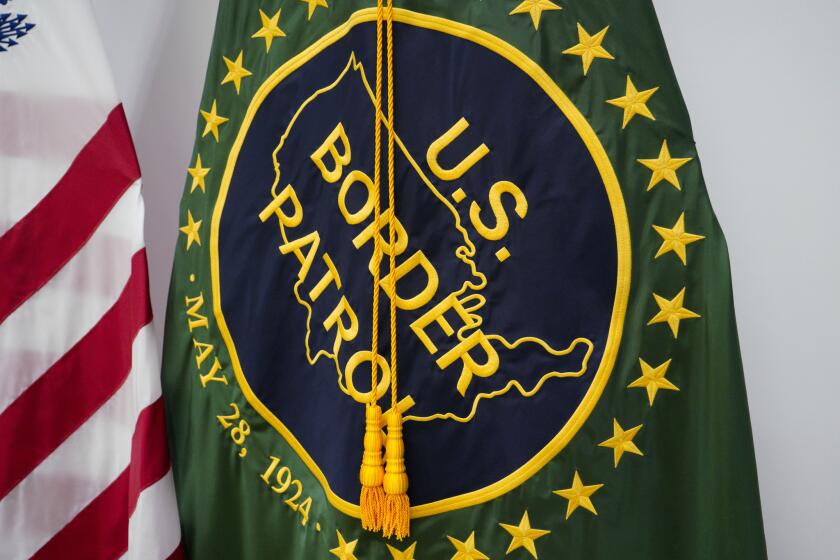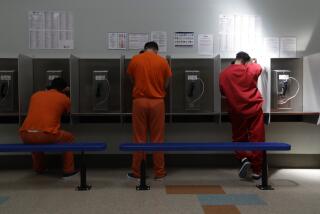ICE says it will review cases for release nationwide as the coronavirus spreads at San Diego detention center

- Share via
SAN DIEGO — As the number of confirmed cases of the novel coronavirus creeps up at Otay Mesa Detention Center, the agency responsible for immigration detention has announced that it will review detainees for release because of health conditions believed to place people at higher risk.
But for some high-risk detainees, that may be too late because of the way people in custody are grouped under quarantine.
The facility holds detainees in immigration custody for Immigration and Customs Enforcement as well as inmates for federal criminal cases for the U.S. Marshals Service.
There are at least six ICE detainees who have tested positive for COVID-19, according to a filing Tuesday from U.S. attorneys in a federal court case in San Diego.
ICE’s web page dedicated to its response to the virus has been slow to update official counts at the facility. The agency said Monday that there were four confirmed cases among its detainees as of Sunday, but the website was not updated to reflect those additional cases until Wednesday.
In addition to the six ICE detainees, four U.S. Marshals inmates at Otay Mesa have tested positive, according to Amanda Gilchrist, spokeswoman for CoreCivic, the private prison company that runs the facility.
Five CoreCivic employees at the facility have also tested positive for the virus, Gilchrist said.
One ICE detainee has been hospitalized, according to court filings, and Gilchrist said one CoreCivic employee has been as well.
ICE said Tuesday that it was reviewing its detained cases nationwide for people who might be especially vulnerable to the virus.
Beginning March 18, ICE did an initial review for detainees who were pregnant or over the age of 70 to determine whether to keep them in custody, according to an April 4 email sent to ICE field office directors from Peter Berg, assistant director of field operations, that was also included in Tuesday’s court filings.
As of March 30, ICE had identified about 600 vulnerable detainees and released “more than 160,” the agency said Tuesday.
The agency’s new review beginning with the April 4 directive will include pregnant detainees or women who gave birth within the past two weeks, people over the age of 60 and people with conditions that would make them immune-compromised, according to Berg’s email.
His email specifically lists blood disorders, chronic kidney disease, compromised immune system, endocrine disorders, metabolic disorders, heart disease, lung disease and neurological conditions.
The complaint, filed with the Department of Homeland Security office of the inspector general, is a latest in a series by the ACLU advocating for better conditions for asylum-seekers in custody.
But that review may be too late for certain high-risk detainees who were already potentially exposed to the virus and are now part of what ICE refers to as a “cohort.”
“Cohorting” means that detainees who have been exposed to the virus, such as those who were held in the same unit as someone who tests positive for the virus, will be kept together and monitored, according to a sworn statement filed in the legal case Tuesday from Dr. Philip Farabaugh, the deputy medical director for ICE Health Service Corps.
The group stays together until it goes through a 14-day period with no new cases, Farabaugh said.
That means someone might manage to avoid being infected by the first person to get the virus in his or her unit but will continue to be held with others who might be contagious for a two-week period that resets every time there is a new case.
For detainees at Otay Mesa Detention Center’s J pod, the unit that had the first confirmed COVID-19 infection at the facility, cohorting is anxiety-inducing — particularly for those who know they have conditions that would make them more likely to have severe symptoms.
J pod detainees say they have not been given any protective gear such as masks or gloves, but officials come into their unit protected from head to toe to take their temperatures. After the temperature checks, some might be taken for further evaluation.
Some come back, others don’t.
When asked what would happen to high-risk detainees who have already been placed in a cohort, the agency said the medical team would determine whether they could be released.
Nearly $30 million worth of cocaine, methamphetamine, heroin, marijuana and fentanyl was seized after a smuggling tunnel that runs from Tijuana to Otay Mesa in San Diego was found, federal officials said
Immigration attorneys Kirsten Zittlau and Bashir Ghazialam filed a new federal court case Wednesday to try to free an asylum seeker from Venezuela being held in the J pod.
Policies such as cohorting “will only result in more individuals contracting the disease, becoming ill and potentially dying,” the attorneys’ complaint says.
The complaint says detainees in the J pod were told Tuesday that even if they pay bond that would normally allow them out of detention, they will have to wait until the group is clear of the 14-day window that will reset any time another person in the unit becomes sick with COVID-19.
There are at least four court cases in the Southern District of California asking for detainees to be released due to the pandemic, including one from the American Civil Liberties Union asking to free four people from ICE custody.
In the case that was filed earliest, the federal government has responded with statements that it provides soap and hand sanitizer in every housing unit. Detainees say they often don’t have any.
Guidelines for detention centers from the Centers for Disease Control and Prevention, filed by government attorneys in the case, say high-risk detainees who have been exposed to the virus should not be kept cohorted with other detainees who have been exposed. It also says that cohorted detainees should be given masks if possible, especially for when they are cleaning.
According to detainees in the J pod, that hasn’t happened.
Morrissey writes for the San Diego Union-Tribune.
As the Trump administration depleted the national stockpile of medical supplies over the last month to fight the coronavirus, it sent hundreds of thousands of masks, respirators and other protective equipment to states with very small outbreaks, new records show.
More to Read
Sign up for Essential California
The most important California stories and recommendations in your inbox every morning.
You may occasionally receive promotional content from the Los Angeles Times.












